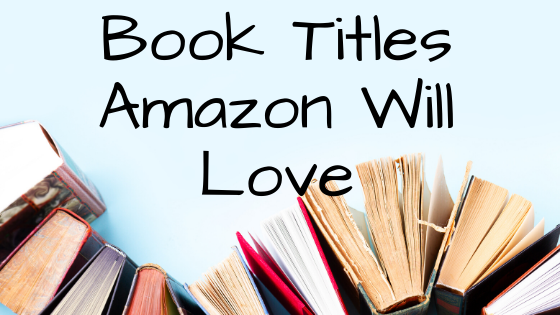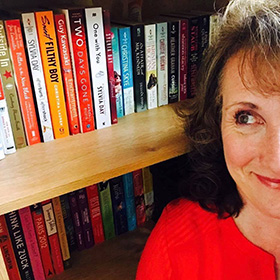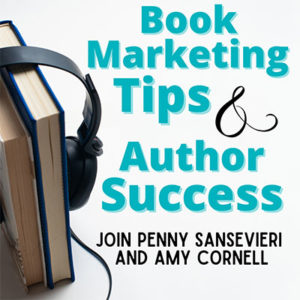We often talk about the importance of book cover design, and when it comes to selling more books this is very key. Book marketing, at its most basic, can’t exist without a great cover, but the book title is equally, if not more, important. Book titles are complex, and often emotional (especially when it comes to fiction or memoire).
A good book title tells the reader immediately what they’re getting. Because if a reader has to guess, you’ve lost a potential book sale. Even in fiction, titles have to be benefits-driven.
Unlike movies or television, books require a bigger commitment from the reader. They require the time and space to read. They require that the reader carve out time for this solo-activity, whereas a movie or tv program can be shared with family or friends. For this isolated leisure activity, you’d better have a title that tells the reader that your book is worth the time investment. In other words, if you are eager to sell more books – your title had better scream to the reader: buy me!
Book Marketing Fails: Where Book Titles Often Go Wrong
We love our books – and we’re close to our books, so it’s natural that we’d want to name them something that feels special to us. But what energy does it bring to the reader? Will the reader resonate with the book title? And most importantly, when it comes to selling more books, does your book title actually sell?
Titles, in general, should accomplish a few goals. First off, they need to speak to the core reader market. Let’s say you have a Christmas romance – ideally your title has something about “Christmas” in it. Or even the word “Holiday” would work, too.
Many times, I see authors creating book titles that force a reader to guess what the book is about. Guessing isn’t a way to sell more books and it certainly won’t sell the reader. The biggest problem I see when it comes to titling a book, is the strong emotional connection the author has to it. In order to pull together a great book title, you have to be willing to step back and let go of your emotional ties to it.
Recipe for a Good Book Title That Will Help You Sell More Books
Certain words often evoke a strong response from readers.
Anchor words such as Scottish, Kidnapping, Organizational – all of these attach themselves to parts of the reader’s brain. This is the mental real estate you own, and the attachment to these words either pulls in the reader or repeals them. That’s book marketing 101.
So be careful how you use these, or use them a lot, depending on the market you’re going after.
Also, remember that consumers, in general, don’t like to work – so a title that implies an easy (or simple) process is always going to get more attention than one that says: The Work You Need to Do – because “work” is another word that has an anchor to it, good or bad. No one likes to do work on themselves, so instead something like 10 Simple Ways to Change Your Life, might be better served.
And yes, it’ll help you sell more books – but make sure that your book does speak to “simple” because if you slap a word like “simple” on the cover and then offer complex theories and processes, your reviews will certainly reflect this.
So, we know that titles are your biggest book marketing asset and must target and hook a reader – but they’re also part of your overall brand, too. And a great title should plant a seed, the implication being that the promise of something greater lies within the pages of your book. The title is the promise, the book has to deliver on that promise. So, as I mentioned above, if you use the word simple, or 10 tips to – you’d better have both in your book.
In addition to evoking some sort of emotion, your title should not be too complex to pronounce – because if it’s hard to pronounce it’s probably hard to type into the Amazon search bar. Which doesn’t bode well for selling more books. Or for that matter, selling any at all.
It also shouldn’t be embarrassing to say or you know, carry around the book.
If, let’s say, you have a book on overcoming shoplifting, maybe that’s a better title to consider as an eBook because you’ll likely sell more that way anyway. Sometimes embarrassing titles can’t be avoided, but often they can.
I once consulted with an author about her book about sex, or problems with a person’s sex life. The book had a big, bold title that evoked only one response: my sex life sucks.
Even if it does, that’s not something most want to admit to. In order to pull in more readers, softening the title could have helped in this case. Not at all soft-pedaling the seriousness of the issue, just not making it so in-your-face. Good book marketing leverages the benefits of the book, without embarrassing the reader – or getting them to admit something they aren’t yet ready to own up to.
One great way to determine a good title is to browse a bookstore and/or Amazon’s store to see what pops out at you.
Look in your genre, specifically, to see what’s selling (looking at the top charts will tell you this).
If you’re comparing titles, stay away from big brand name authors if you can. By this I mean that Stephen King could probably slap any book title he wanted to on his cover, it likely wouldn’t matter – his fans would buy it anyway. Being a savvy book marketing-minded author, there’s not a chance he’d ever do this, but you get the idea.
As you’re digging into your book marketing, and doing a title comparison, look for authors who aren’t well-known but are still hitting high notes on Amazon. Then, when you have a dozen or so books you think have really great titles, start reading through the book reviews to see if the titles live up to the book. Readers are pretty frank, if a title didn’t live up to reader expectations, you’ll see it in the book reviews – and this is a good thing to know before you head down a particular path. The idea is not just to sell one book to one reader, but if the goal is selling more books – and building more readers – reviews tell the story and sometimes don’t always tell the one you were expecting. Mismanaged reader expectations is always a big one.
We had an author put the word “Christmas” in the title, and though the book was set during the Christmas season, she didn’t include a lot of “Christmas” in it. There were no vignettes of cookie making or tree decorating. For whatever reason she decided to make it Christmas-light and readers commented. So, as I mentioned earlier, beware of the key phrases you use in your title, because readers will notice.
One-word titles are a personal pet-peeve of mine, mostly because it’s tough to crack the Amazon algorithm with a one-word title. If you do that, better be sure you have a very strong subtitle – and even then, I’m not a fan. One-word titles are not only tough to rank on Amazon, but it’s tough to do ads for these books, too – mostly because one-word book titles can eat up a lot of your ad dollars if you’re not careful. It’s not out of the realm to do this (and lots of authors have one-word book titles) just be careful that you could spend a lot of your book marketing time trying to explain your book – and that never bodes well for selling more books.
Book Marketing Win: Book Titles as Hooks and Benefits
Certain book titles just scream benefits, don’t they? While others, just hook us. For example:
Company of One – seems intriguing, doesn’t it? And a quick glance at the subtitle tells me that (as a business owner) this is maybe something I want to read: Why Staying Small is the Next Best Thing for Business.
And if I’m looking at fiction, I spy a mystery book called: Lock Every Door – now that’s a title that hooks me! See what I mean?
Every book title, regardless of the genre, should either scream the benefits, or have some kind of hook. If you’re lucky, your book title will have both.
Book Title Tools to Help You Sell More Books
For years, readers have commented how much they love my book title: How to Sell Books by the Truckload on Amazon – which is a book that gets rewritten/updated each year, but one thing I never change is the title.
It wasn’t by accident that this book got the name it did. I stumbled across these particular keywords (and then later fashioned them into a title) when I was doing some Amazon keyword research – and I discovered some key phrases my readers were searching on.
Since my book was non-fiction it was easy to incorporate these. But what if your book is fiction?
Good titles that help support your book marketing are certainly harder for fiction, but not impossible. I pointed out earlier, if you know your market, and start digging through similar books on Amazon and in bookstores, you’ll see a theme with book titles (keywords) that work well in your particular genre. Then, you can use particular keywords in your subtitle (just on Amazon) and I have a blog post on this, too. I’ll put the link in the resource section below!
What about other tools for titling your book? There are keyword tools out there, like Google Adwords, Keyword Planner, etc. These work great for book marketing in general, but your best tool is really Amazon and doing some manual searches. You can also grab a few titles you love and then run them by your email list or social media fan base to get their perspective and input.
How Do You Know Your Book Title isn’t Working?
This is a million-dollar question, because a good book title can really help sell more books – while a bad book title will repel readers, instead of pulling them in. But your book is already out, so how do you know if your book title is working? Here are some ways that might give you some insight into whether you should rethink your existing book title:
- Reader reviews seem not-so-great: As I pointed out earlier, readers were drawn to your book because of the title and the cover, but they were disappointed along the way? If the writing and editing is being called into question, that’s not book-title related. But if the reader expectations are not being met, and readers are commenting on this in reviews, then your title may need some work.
- You have to explain the book too much: If someone asks you what your book title is, do you find yourself explaining it to them as well? It’s one thing if they’ve asked you what it’s about, but if they seem confused after you’ve told them the book title, maybe that’s a sign you need a new one.
- Your book title is long: Though I didn’t discuss it in this piece per se, the longer the book title, the harder it is to remember.
These are just a few things that tend to pop up, time and time again, when a book has a bad title.
If you already have a book out and you feel like your title needs work, what should you do? How about a re-release? I’ve written a book on this, you can grab it here: https://amzn.to/2F3ZNa8
Though suffice it to say, it’s maybe not a bad idea – and will help boost your overall book marketing, to rename an existing book.
Before and After: Famous Books and Titles That Didn’t Make the Cut
Just for fun, let’s have a look at some book titles that almost-were and see if you can spot why the title that was finally used, was so much better!
- To Kill a Mockingbird was originally going to be called: Atticus
- The author of Catch-22 had toyed with the idea of calling the book Catch-11
- Pride and Prejudice was going to be called First Impressions – see what I mean? The title they went with was so much better!
- The Secret Garden was originally going to be called Mistress Mary
So as you can see, titles carry great weight – and even our most classic authors struggled with book titles, which makes you almost wonder how many wonderful books have we missed out on because the titles weren’t enough to pull readers in?
Don’t let your book be one of those almost-famous tomes that didn’t quite make it onto the bestseller list! Having a great book title is not only good for your author platform, but it also helps to sell more books – and isn’t that what we all want?
Good luck!
Please use the social share buttons below if you learned something from this post – your shares really help educate other authors, which raises the bar for publishing and gets more books in readers hands!
Resources and Free Downloads
5 Ways to (Still) Sell More Books in 2020
The Top 12 Questions I’m Asked About How to Market a Book
Get a Custom Marketing Assessment and Personalized Recommendations






0 Comments